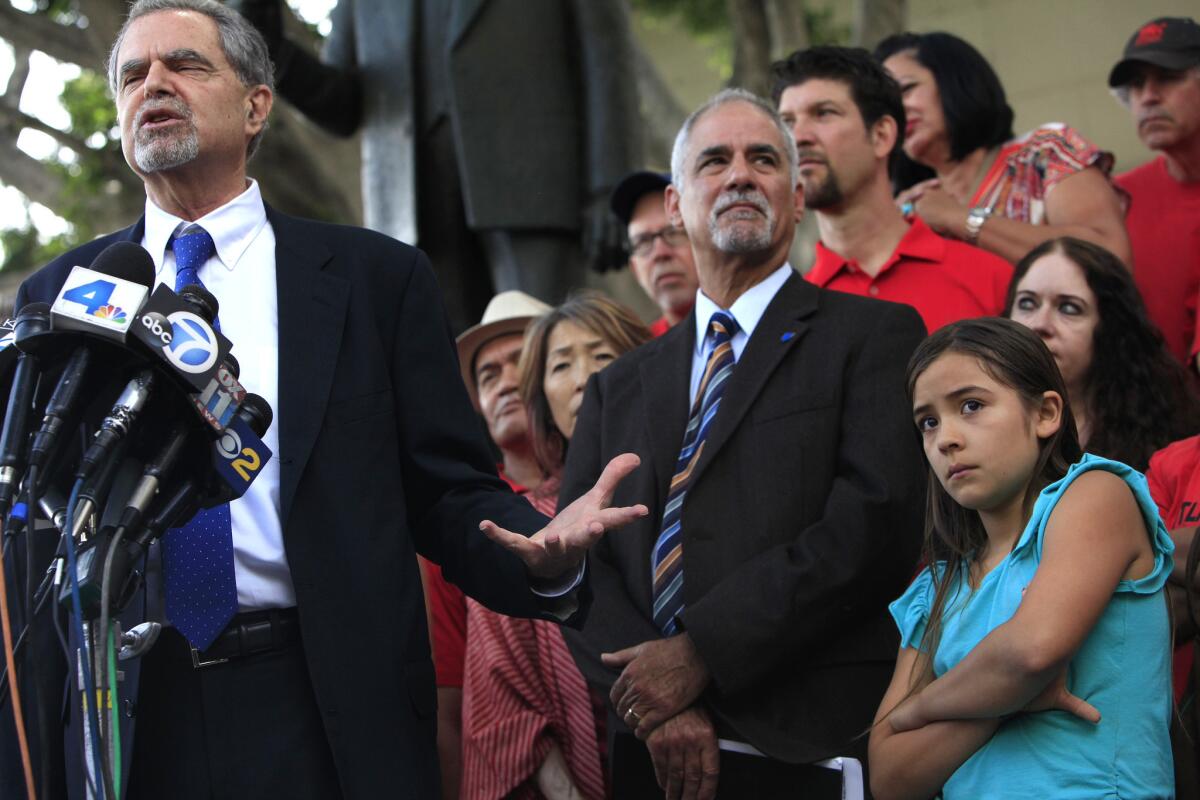Bill to speed firing of some public school teachers advances

- Share via
A bill to hasten the dismissal of some public school teachers appears to be speeding into law, but it won’t calm the furor unleashed last week when a judge threw out key job protections for California instructors.
The faster process would apply to teachers suspected of serious offenses, such as attempted murder, sexual misconduct or drug offenses. It does not require that an instructor be convicted of a crime to be fired, only that a school district has determined that the employee is unfit for the classroom.
Under current law, appeals of dismissals can extend for well over a year, which can result in legal costs of several hundred thousand dollars. For that reason, the changes are a huge step forward, supporters said.
The broader dismissal process was a target in Vergara vs. California, a lawsuit decided last week.
In his ruling, L.A. County Superior Court Judge Rolf M. Treu threw out the state’s system for dismissing teachers. He said the cost and time required were so prohibitive that districts failed to act against grossly ineffective instructors.
He said the result was a violation of students rights to an equal education opportunity under the state Constitution. Poor and minority students particularly are harmed by an unnecessarily high number of bad teachers, he concluded.
Using similar reasoning, the judge also eliminated the state process under which teachers receive the strong job protections of tenure. And, he ruled that quality as well as seniority must be considered when laying off a teacher because of budget cuts.
As the trial progressed in Los Angeles, the bill, written by Assemblywoman Joan Buchanan (D-Alamo) was working its way through the Legislature. The measure passed the Assembly and the Senate without opposition and awaits the governor’s signature to become law.
Under it, an instructor accused of the most serious offenses would have 30 days after being fired to file for an independent hearing, which must then begin in 60 days. These hearings would be conducted by an administrative law judge, whose decision would be binding.
“The proposed changes will make all California public schools safer and keep more education resources in the classroom where they belong,” said Bill Lucia, president of EdVoice, a Sacramento-based advocacy group that frequently opposes teacher unions.
On this bill, however, EdVoice and the California Teachers Assn. became allied, working through disagreements.
Those opposed include the Assn. of California School Administrators and L.A. schools Supt. John Deasy. The association said that some serious misconduct would fall outside the new system, such as spousal abuse or armed robbery. And the new process itself would have rules making it unwieldy and unworkable, the group said.
“We just won’t use this process since it is impossible to make the deadlines,” said Laura Preston, legislative advocate for the association.
The bill also amends other rules. It would for the first time allow evidence older than four years to be used in cases of alleged sexual misconduct.
The most substantial changes, however, apply only to misconduct defined as “egregious.” Because of that limitation, critics said the changes don’t go far enough. They want to see a more streamlined process applied to any teacher a district wants to release for any legitimate reason, including ineffective teaching.
Lawmakers had made several unsuccessful attempts in recent years to make it easier to fire teachers charged with severe offenses after a string of high-profile abuse cases. Teacher unions used their influence to help block these bills, calling them an overreach that needlessly diminished the rights of teachers. The unions also defended the state laws under challenge in the Vergara case.
The rules for firing teachers rose to public prominence after the 2012 arrest of Mark Berndt, a teacher at Miramonte Elementary School in the Los Angeles Unified School District who was charged with 23 counts of lewd conduct.
L.A. Unified has blamed problems with the firing process for its decision to pay the veteran teacher $40,000 to drop his challenge to his dismissal. At the time, law enforcement was conducting a lengthy, confidential investigation and would not share its full evidence with the school system. The district was concerned that it could lose the case against Berndt and have to reinstate him.
Berndt eventually pleaded no contest and was sentenced to 25 years in prison.
Shortly after Berndt’s arrest, Deasy pushed for changes similar to those in Buchanan’s bill.
Last week, however, Deasy said the bill merely tweaked a process that was in need of wholesale revision. And the court, in throwing out the old dismissal system, made this bill somewhat pointless, he added.
“I don’t think this comes close to fixing the constitutional problems the judge pointed out,” said Deasy, who heads the state’s largest school system. During the court case, L.A. Unified had said it would immediately fire 350 teachers if state laws made it easier to do so.
The bill would take effect in January. The ruling in the Vergara case is on hold pending appeals, which could take months or several years.
Twitter: @howardblume
Times staff writer Melanie Mason in Sacramento contributed to this report.
More to Read
Sign up for Essential California
The most important California stories and recommendations in your inbox every morning.
You may occasionally receive promotional content from the Los Angeles Times.











